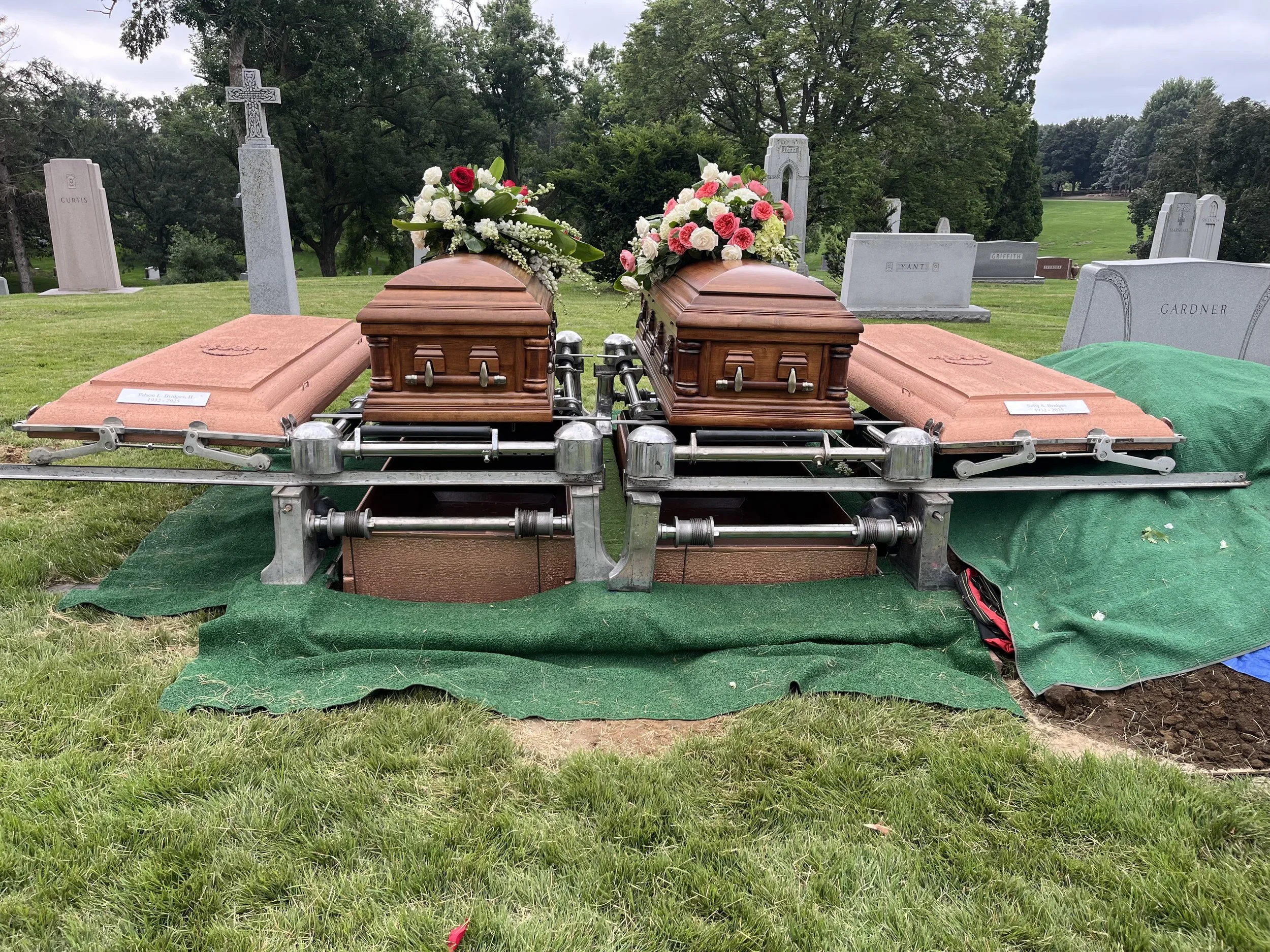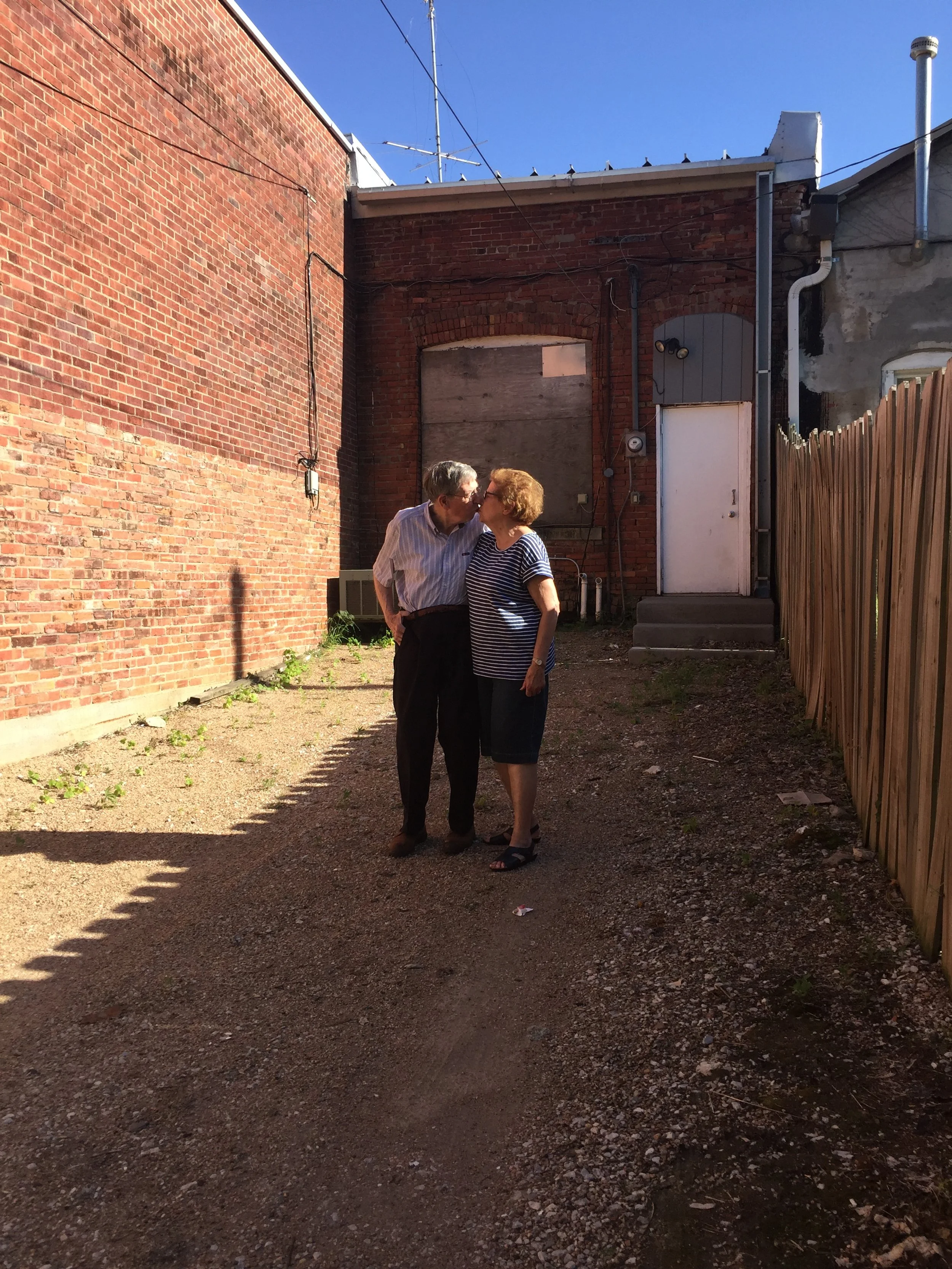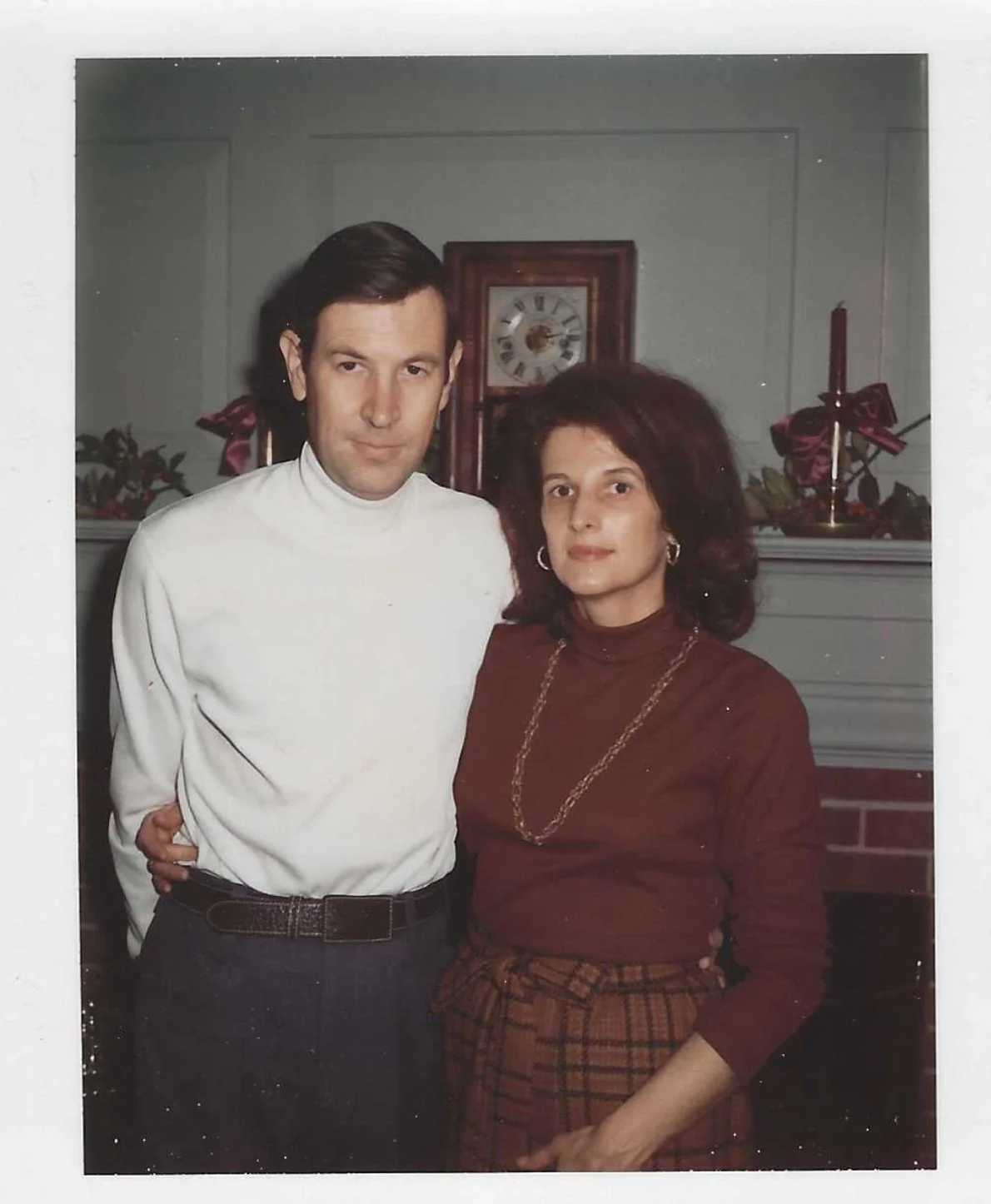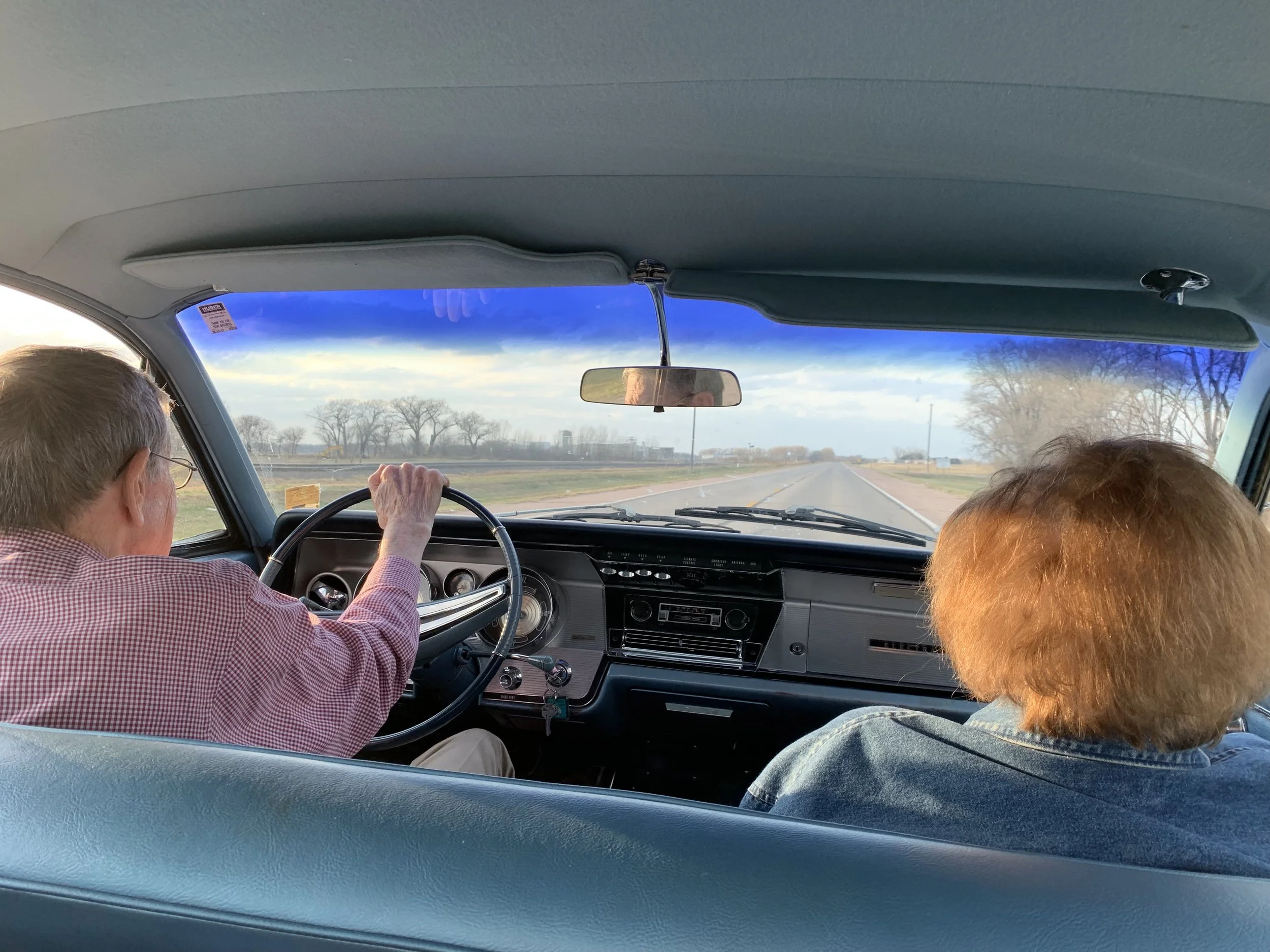Sally & Edson
Two maple coffins glowed side by side on a warm Nebraska morning. Inside were my grandparents, Sally and Edson Bridges. They died four days apart this past July, and despite low-hanging clouds and cousins’ black dresses and tears that held stubbornly in the bays of my eyelids, I felt joyful. These two people lived for ninety-three years. My grandpa went first, then my grandma let go. They were smitten to the end.
My dad and I flew into Omaha a couple days before the funeral and grabbed lunch with some relatives at a tavern downtown. There were six of us. I ordered a filthy blue cheese martini and listened to stories about Edson and Sally over a platter of apples and melted brie. My dad’s cousin talked about how she loved going to my grandparents’ house for dinner as a child, how warm my grandma was, how during all those years, Grandma lost her temper only once. (The cousin was running around the living room, which put several prized antiques in jeopardy.)
I realized, not for the first time, that I was surrounded by people who had spent far more hours with my grandparents than I had. I love my grandparents, and I feel I have a good sense of who they are as people. But as the double-funeral drew closer and family members swapped hilarious and touching stories to help my uncle form his eulogy, I was reminded of just how much I didn’t know. I had grown up half a country away and saw my grandparents only a couple times a year.
Before sitting down to write about my grandparents, I asked my family members to send me their memories. One of my cousins, who grew up in Omaha and saw our grandparents regularly, sent me six beautiful stories. In his first memory—not just of Grandma and Grandpa, but his first memory ever—he’s flying down a snowy hill on a runner sled from the 60’s, nestled in Grandpa’s lap, headed straight for a fence. Grandpa stops the sled at the last second. My cousin still has that sled hanging in his garage.
Though I don’t have any regrets about growing up in North Carolina, the memories I have with my grandparents—most of which are physical details or poignant phrases I’ve managed to hold on to—feel small in comparison.
This, I think, is where being a writer comes in handy. Even before I saw myself as a writer, I found my attention zeroing in on tiny details and committing them to memory like Bible verses. So, when I reflect on who my grandparents are to me, what I find instead of grand artifacts is a small box of trinkets: smells, mannerisms, phrases, chuckles, hands. These, padded by facts about them that everyone just knows, are my tools to navigate the strange tension that comes with mourning people I didn’t get to spend very much time with. Here is what some of those trinkets amount to.
My grandpa: the most formal person I’ve ever met. Every single day of his life–even into his nineties, when he lived in a nursing home and had not had a business meeting in twenty years–he wore a dark gray suit, shiny black dress shoes, and a burgundy tie. The only exceptions I ever witnessed were when we went to the Omaha Zoo on my family’s visits to Nebraska, during which he wore knee-length denim shorts, a short sleeved light blue button down, and brown leather sneakers with tall white socks. I saw him wear a t-shirt only once, and I found it jarring.
This formality extended to his mannerisms and way of speaking. Grandpa had strong, knobby fingers and a very soft voice. He spoke in complete, measured sentences. He did not tell jokes. He referenced God often, and as he grew senile, he took to quoting Bible verses in conversation. They served as touchpoints when he lost his train of thought. He had a flimsy day planner—the same kind every month—that he kept notes in. When my dad and I walked through my grandparents’ house the day before the funeral, I found a stack of the planners and flipped through a couple. In the tiny “notes” section at the bottom of each week’s page, he had a grocery list. I learned he loved bananas.
Grandma wore warm colors and gold jewelry. When she was around her kids and grandkids, she physically lit up–her cheeks turned a little golden. She loved George Washington, didn’t like cooking, and had a very high pain tolerance. She collected porcelain Staffordshire dogs, and had about twelve million of them.
If Grandpa moved through the world like a train—never slowing, adjusting, or wavering from his beliefs or way of being for any reason—Grandma moved through the world like a honeybee, or a sunbeam, or a mourning dove. In all my memories of her, she’s smiling. She’s cooing. She’s telling me she loves me in her sweet, perky voice. She’s handing out Beanie Babies—dozens of them. She’s holding me on her lap while I play with her bracelet. She’s clasping Grandpa’s hand. I think this is the way Grandma would want me to remember her, which is why she’s harder to write about. I get the sense that the version of Sally I received was carefully, lovingly crafted.
One reason for this, I think, is that my grandma—like all of our grandmas—grew up in an era that viewed women purely as support: to their husbands, children, and communities. I remember in their final years, when Grandpa was telling me about his lifelong love of cross-country skiing, I asked Grandma if she ever skied with him. She sighed and said, with a mild mix of amusement and sadness, “When I was growing up, girls didn’t really do that stuff.”
It was a rare unfiltered moment. I’m curious about the life my grandmother would choose if she were my age today. I truly believe—with her brain power and emotional savvy—she could do anything. Luckily, Grandma did love being a wife and mother, and I imagine she’d choose those paths again. I just wish I had been around her enough to get past the radiant pleasantness and hear her complain, or discover what makes her tick, or learn about her gratitude and missteps. But I now understand that the constant, warm presence she put forth was an act of love. Because we didn’t get to see each other often, it was paramount that I had a firm view of my grandmother as someone who would always, always cherish me.
Something else I love about my grandma, which I only began to pick up on fairly recently, is that she was knock-your-socks-off brilliant. Underneath the sugary exterior was the smartest person in the room. I don’t know when I first started noticing, and I wish I had a memory that properly conveyed her intelligence. What I have in its place is a phone call I received from my dad four or five years ago. He told me that Grandma and Grandpa had been given IQ tests. They had just been diagnosed with dementia and Alzheimer’s, respectively, and doctors wanted to establish a baseline of intelligence so they could measure cognitive decline. I’m aware of how fraught and misleading these tests can be, but hear me out: My grandpa—an unequivocally brilliant man who ran a successful investment company for decades—tested in the 86th percentile. Grandma—the sweet, gentle homemaker—tested in the 98th. My dad was delighted and amused by this. I remember feeling unsurprised, and I couldn’t pinpoint why.
I also felt unsurprised when, four days after Grandpa died, I got the text saying Grandma had passed away, too. My grandparents had both been in hospice, so neither of their deaths were shocking. But the sheer closeness of the dates—the double funeral of it all—was unexpected. I attribute it solely to my grandmother’s willpower. She made the decision to follow Grandpa into the afterlife. When I got the news, I thought, She really did it. Sally pulled it off.
At the foot of this final act of love, I offer up a small, closing memory, and that’s the smell of my grandparents’ house. Picture a paper bag, some pine, a little cinnamon, a roaring fire in a stone fireplace, and old wool yarn. It was intoxicating. The scent clung to the ancient needlepoint samplers, dark walnut coffee tables, basement shag carpet, and massive toy train set. It hung over the extra firm mattresses and leaning piles of photo albums. It’s the kind of layered smell that comes only from years and years of living in a place and filling it with care of all kinds. Standing in that house, I could smell dozens of Christmas trees being hauled into and out of the living room, loads of laundry that grew alongside three children, crackling logs that cast a glow on my grandparents’ clasped hands. I’m in awe of the home and love they built.
In 1952, Edson Bridges got stranded in Ashland, Nebraska during a blizzard. He was driving, and the storm got too fierce. He found a place to leave his dad’s car and hurried to a train station, where he boarded a train to Omaha. Sally Sveska was on that train, chatting with her twin sister. When Edson boarded, she looked up at him. She saw his gentle, serious demeanor, his dark hair dusted with snow. She smiled.





